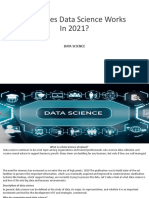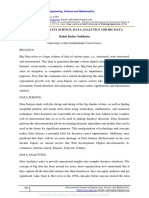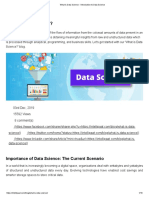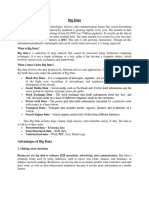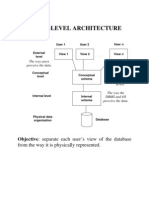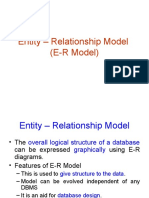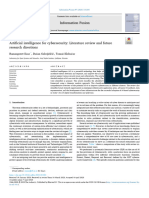Data Science
Data Science
Uploaded by
TimsonCopyright:
Available Formats
Data Science
Data Science
Uploaded by
TimsonOriginal Description:
Original Title
Copyright
Available Formats
Share this document
Did you find this document useful?
Is this content inappropriate?
Copyright:
Available Formats
Data Science
Data Science
Uploaded by
TimsonCopyright:
Available Formats
Chapter Abstract:Data science encompasses a set of principles, problem definitions,
algorithms, and processes for extracting nonobvious and useful patterns from large data
sets. Many of the elements of data science have been developed in related fields such as
machine learning and data mining. In fact, the terms data science, machine learning, and
data mining are often used interchangeably. The commonality across these disciplines is a
focus on improving decision making through the analysis of data. However, although data
science borrows from these other fields, it is broader in scope. Machine learning (ML)
focuses on the design and evaluation of algorithms for extracting patterns from data. Data
mining generally deals with the analysis of structured data and often implies an emphasis
on commercial applications. Data science takes all of these considerations into account but
also takes up other challenges, such as the capturing, cleaning, and transforming of
unstructured social media and web data; the use of big-data technologies to store and
process big, unstructured data sets; and questions related to data ethics and
regulation.View less
Data science has become a fundamental discipline, both in the field of basic research and in the resolution of
applied problems, where statistics and computer science intersect. Thus, from the perspective of the data itself,
machine learning, operation research, methods and algorithms, and data mining techniques are aligned to
address new challenges characterised by the complexity, volume and heterogeneous nature of data.
Introduction to Data Science
Data Science is the study of data. It is about extracting, analyzing, visualizing,
managing and storing data to create insights. These insights help the companies to make
powerful data-driven decisions. Data Science requires the usage of both unstructured
and structured data.
It is a multidisciplinary field that has its roots in statistics, math and computer science.
It is one of the most highly sought after jobs due to the abundance of data science
position and a lucrative pay-scale. So, this was a brief to data science, now let’s explore
the pros and cons of data science.
Don’t forget to check top Data Science Books
Stay updated with latest technology trends
Join DataFlair on Telegram!!
Pros and Cons of Data Science
The field of Data Science is massive and has its own fair share of advantages and
limitations. So, here we will measure the pros and cons of Data Science. This article will
help you to assess yourself and take the right course in the field of Data Science.
a. Advantages of Data Science
The various benefits of Data Science are as follows:
1. It’s in Demand
Data Science is greatly in demand. Prospective job seekers have numerous
opportunities. It is the fastest growing job on Linkedin and is predicted to create 11.5
million jobs by 2026. This makes Data Science a highly employable job sector.
2. Abundance of Positions
There are very few people who have the required skill-set to become a complete
Data Scientist. This makes Data Science less saturated as compared with other IT
sectors.
Therefore, Data Science is a vastly abundant field and has a lot of opportunities. The
field of Data Science is high in demand but low in supply of Data Scientists.
3. A Highly Paid Career
Data Science is one of the most highly paid jobs. According to Glassdoor, Data Scientists
make an average of $116,100 per year. This makes Data Science a highly lucrative career
option.
4. Data Science is Versatile
There are numerous applications of Data Science. It is widely used in health-care,
banking, consultancy services, and e-commerce industries. Data Science is a very
versatile field. Therefore, you will have the opportunity to work in various fields.
5. Data Science Makes Data Better
Companies require skilled Data Scientists to process and analyze their data. They not
only analyze the data but also improve its quality. Therefore, Data Science deals with
enriching data and making it better for their company.
Explore the Future of Data Science
6. Data Scientists are Highly Prestigious
Data Scientists allow companies to make smarter business decisions. Companies rely on
Data Scientists and use their expertise to provide better results to their clients. This
gives Data Scientists an important position in the company.
7. No More Boring Tasks
Data Science has helped various industries to automate redundant tasks. Companies are
using historical data to train machines in order to perform repetitive tasks. This has
simplified the arduous jobs undertaken by humans before.
8. Data Science Makes Products Smarter
Data Science involves the usage of Machine Learning which has enabled industries
to create better products tailored specifically for customer experiences.
For example, Recommendation Systems used by e-commerce websites provide
personalized insights to users based on their historical purchases. This has enabled
computers to understand human-behavior and take data-driven decisions.
9. Data Science can Save Lives
Healthcare sector has been greatly improved because of Data Science. With the advent
of machine learning, it has been made easier to detect early-stage tumors. Also, many
other health-care industries are using Data Science to help their clients.
10. Data Science Can Make You A Better Person
Data Science will not only give you a great career but will also help you in personal
growth. You will be able to have a problem-solving attitude. Since many Data Science
roles bridge IT and Management, you will be able to enjoy the best of both worlds.
b. Disadvantages of Data Science
While Data Science is a very lucrative career option, there are also various disadvantages
to this field. In order to understand the full picture of Data Science, we must also know
the limitations of Data Science. Some of them are as follows:
1. Data Science is Blurry Term
Data Science is a very general term and does not have a definite definition. While it has
become a buzzword, it is very hard to write down the exact meaning of a Data
Scientist. A Data Scientist’s specific role depends on the field that the company is
specializing in.
While some people have described Data Science to be the fourth paradigm of Science,
few critics have called it a mere rebranding of Statistics.
2. Mastering Data Science is near to impossible
Being a mixture of many fields, Data Science stems from Statistics, Computer Science
and Mathematics. It is far from possible to master each field and be equivalently expert
in all of them.
While many online courses have been trying to fill the skill-gap that the data science
industry is facing, it is still not possible to be proficient at it considering the immensity
of the field.
A person with a background in Statistics may not be able to master Computer Science on
short notice in order to become a proficient Data Scientist. Therefore, it is an ever-
changing, dynamic field that requires the person to keep learning the various avenues of
Data Science.
3. Large Amount of Domain Knowledge Required
Another disadvantage of Data Science is its dependency on Domain Knowledge. A
person with a considerable background in Statistics and Computer Science will find it
difficult to solve Data Science problem without its background knowledge.
The same holds true for its vice-versa. For example, A health-care industry working on
an analysis of genomic sequences will require a suitable employee with some knowledge
of genetics and molecular biology.
This allows the Data Scientists to make calculated decisions in order to assist the
company. However, it becomes difficult for a Data Scientist from a different background
to acquire specific domain knowledge. This also makes it difficult to migrate from one
industry to another.
4. Arbitrary Data May Yield Unexpected Results
A Data Scientist analyzes the data and makes careful predictions in order to facilitate the
decision-making process. Many times, the data provided is arbitrary and does not yield
expected results. This can also fail due to weak management and poor utilization of
resources.
You Must Read – Difference Between Data Science and Data
Analytics
5. Problem of Data Privacy
For many industries, data is their fuel. Data Scientists help companies make data-driven
decisions. However, the data utilized in the process may breach the privacy of
customers.
The personal data of clients are visible to the parent company and may at times cause
data leaks due to lapse in security. The ethical issues regarding preservation of data-
privacy and its usage have been a concern for many industries.
Summary
After weighing the pros and cons of Data Science we are able to envision the full picture
of this field. While Data Science is a field with many lucrative advantages, it
also suffers from its disadvantages.
Being a less-saturated, high paying field that has revolutionized several walks of life, it
also has its own backdrops when considering the immensity of the field and its cross-
disciplinary nature.
Data Science is an ever-evolving field that will take years to gain proficiency. In the end,
it is up to you to decide whether the pros of Data Science motivate you to take this up as
your future career or the cons that help you take a careful decision!
Hope you liked our article on the pros and cons of data science. Share your feedback
through comments.
You might also like
- Big Data Demystified - How To Use Big Data, Data Science and AI To Make Better Business Decisions and Gain Competitive AdvantageDocument196 pagesBig Data Demystified - How To Use Big Data, Data Science and AI To Make Better Business Decisions and Gain Competitive AdvantageAshfaque Reza100% (4)
- Chapter 9 Business Analytics AssignementsDocument7 pagesChapter 9 Business Analytics Assignementschris waltersNo ratings yet
- How Does Data Science Works in 2021Document9 pagesHow Does Data Science Works in 2021Pushpinder SainiNo ratings yet
- Data ScienceDocument18 pagesData Sciencemyperson.kruthiNo ratings yet
- DSBDA Unit 1Document16 pagesDSBDA Unit 1koroxa6604No ratings yet
- 1 - Introduction To Data ScienceDocument28 pages1 - Introduction To Data Sciencesmallikarjun713No ratings yet
- Data Science Career GuideDocument19 pagesData Science Career GuideHarsha G HNo ratings yet
- Big Data Research Papers PDFDocument7 pagesBig Data Research Papers PDFbzkonqznd100% (1)
- Data ScienceDocument18 pagesData Sciencemyperson.kruthiNo ratings yet
- Education Redefined SeriesDocument15 pagesEducation Redefined SeriesjayNo ratings yet
- Data Science RoadmapDocument9 pagesData Science RoadmapWong Chee Fah100% (1)
- Slide Voice ContentDocument20 pagesSlide Voice ContentSellam VNo ratings yet
- Basic Data ScienceDocument2 pagesBasic Data SciencenitdrjothilakshmiNo ratings yet
- Recent Research Papers On Big Data PDFDocument6 pagesRecent Research Papers On Big Data PDFafnkjdhxlewftq100% (1)
- Big Data Term PaperDocument6 pagesBig Data Term Paperaflsiosbe100% (1)
- Big DataDocument7 pagesBig DataSundaram yadavNo ratings yet
- Research On Data Science, Data Analytics and Big Data Rahul Reddy NadikattuDocument7 pagesResearch On Data Science, Data Analytics and Big Data Rahul Reddy NadikattuColin StantosNo ratings yet
- Term Paper On Big DataDocument6 pagesTerm Paper On Big Datacdkxbcrif100% (1)
- Big Data Analytics DissertationDocument7 pagesBig Data Analytics DissertationInstantPaperWriterUK100% (1)
- (DSBDA) Unit 1 Introduction To Data ScienceDocument14 pages(DSBDA) Unit 1 Introduction To Data SciencecallhimsidNo ratings yet
- BD - eBOOK Big Data Data ScientistDocument11 pagesBD - eBOOK Big Data Data ScientistkkuppachiNo ratings yet
- Data Science vs. Data Analytics Understanding the DifferencesDocument5 pagesData Science vs. Data Analytics Understanding the DifferencescodewithtushpatNo ratings yet
- Data Science Career GuideDocument11 pagesData Science Career GuidetariqbgeNo ratings yet
- Master Thesis Big Data PDFDocument5 pagesMaster Thesis Big Data PDFfjfcww51100% (2)
- What Is Data - Types of Data, and How To Analyze Data (Updated)Document8 pagesWhat Is Data - Types of Data, and How To Analyze Data (Updated)Valentina TimofeevNo ratings yet
- The+Complete+Guide+to+Landing+a+Career+in+Data July+2018Document47 pagesThe+Complete+Guide+to+Landing+a+Career+in+Data July+2018Gabriel100% (1)
- Wepik Unleashing The Power of Data Science Unlocking Insights For Business Success 20231028080159NgQFDocument14 pagesWepik Unleashing The Power of Data Science Unlocking Insights For Business Success 20231028080159NgQFguruprasaaths.22cseNo ratings yet
- Best Research Papers On Big DataDocument4 pagesBest Research Papers On Big Datafvet7q93100% (1)
- Data Science Career GuideDocument11 pagesData Science Career GuideDheeka Hani Soeroso100% (2)
- Big Data Applications and ToolsDocument16 pagesBig Data Applications and ToolsDr Amany MokhtarNo ratings yet
- ICT30005 - Assignment 1 - Begum Bolu 6623433 - Big Data AnalyticsDocument7 pagesICT30005 - Assignment 1 - Begum Bolu 6623433 - Big Data AnalyticsbboluNo ratings yet
- William Wizner - Python For Data Science - Data Analysis and Deep Learning With Python Coding and ProgrammingDocument73 pagesWilliam Wizner - Python For Data Science - Data Analysis and Deep Learning With Python Coding and ProgrammingSergey Rosenfeld100% (1)
- Big Data Research Papers 2015Document9 pagesBig Data Research Papers 2015egw4qvw3100% (1)
- Research Paper On Big Data PDFDocument6 pagesResearch Paper On Big Data PDFzrpcnkrif100% (1)
- Chapter 3 Big Data Analytics and Big Data Analytics Techniques PDFDocument22 pagesChapter 3 Big Data Analytics and Big Data Analytics Techniques PDFMamNo ratings yet
- 2053-Article Text-5361-1-10-20191011Document11 pages2053-Article Text-5361-1-10-20191011anshara nadeejaNo ratings yet
- Big Data Research Papers 2014 PDFDocument5 pagesBig Data Research Papers 2014 PDFwwvmdfvkg100% (1)
- Big Data Research PapersDocument7 pagesBig Data Research Paperscajzsqp2100% (1)
- A Review Paper On Why Data Science Isnt Producing Desired Results and How Can This Be Fixed IJERTV8IS090105Document5 pagesA Review Paper On Why Data Science Isnt Producing Desired Results and How Can This Be Fixed IJERTV8IS090105rohanNo ratings yet
- Data Science 2020Document123 pagesData Science 2020jakir100% (1)
- What Is Data Science - Introduction To Data ScienceDocument18 pagesWhat Is Data Science - Introduction To Data ScienceDeven RajNo ratings yet
- How Big Data Is DifferentDocument4 pagesHow Big Data Is DifferentyoltorshuulNo ratings yet
- Introduction To Data Science - A Beginner GuideDocument18 pagesIntroduction To Data Science - A Beginner GuideVigna CulattaNo ratings yet
- R Programming UNIT-1Document48 pagesR Programming UNIT-1padmaNo ratings yet
- Data Science for Beginners: A Beginner's Guide to the World of AnalyticsFrom EverandData Science for Beginners: A Beginner's Guide to the World of AnalyticsNo ratings yet
- Big Data: CharacteristicsDocument4 pagesBig Data: CharacteristicsMuhammad HamzaNo ratings yet
- Introduction To DatascienceDocument15 pagesIntroduction To DatascienceIUB VIBESNo ratings yet
- Hadoop BIG DATA Interview Questions You'll Most Likely Be AskedDocument20 pagesHadoop BIG DATA Interview Questions You'll Most Likely Be AskedVibrant PublishersNo ratings yet
- 2019 Meninder Purewal Successful AI Data ProductsDocument13 pages2019 Meninder Purewal Successful AI Data ProductssnausagesNo ratings yet
- IDS Unit 1 NotesDocument24 pagesIDS Unit 1 NotesPavan KumarNo ratings yet
- Big Data AnalyticsDocument82 pagesBig Data AnalyticsPrachi BehlNo ratings yet
- Introduction To Big Data Unit - 2Document75 pagesIntroduction To Big Data Unit - 2Sovit ChaudharyNo ratings yet
- Tut 3 DS - QDocument2 pagesTut 3 DS - QPang Sze WenNo ratings yet
- DataScientist v2Document14 pagesDataScientist v2Hero NemoNo ratings yet
- Big DataDocument35 pagesBig DataMalik AliNo ratings yet
- Unit 1 DADocument72 pagesUnit 1 DANeha SinghNo ratings yet
- Applying Data Science: How to Create Value with Artificial IntelligenceFrom EverandApplying Data Science: How to Create Value with Artificial IntelligenceNo ratings yet
- Big Data IntroductionDocument6 pagesBig Data Introductionpallavibhardwaj1125No ratings yet
- CHAPTER ONE - 3 HDocument28 pagesCHAPTER ONE - 3 HTimsonNo ratings yet
- Joseph Blessing SeminarDocument11 pagesJoseph Blessing SeminarTimsonNo ratings yet
- Eniola trd,+UIJSLICTR 8 1 Pgs 39 55Document17 pagesEniola trd,+UIJSLICTR 8 1 Pgs 39 55TimsonNo ratings yet
- Journal AnOnlineResultProcessingDocument14 pagesJournal AnOnlineResultProcessingTimsonNo ratings yet
- 01 SlideDocument7 pages01 SlideTimsonNo ratings yet
- Real Estate Price Prediction Based On Linear RegreDocument10 pagesReal Estate Price Prediction Based On Linear RegreTimsonNo ratings yet
- Emma ProjectDocument65 pagesEmma ProjectTimsonNo ratings yet
- Data Management System Design of DisasteDocument9 pagesData Management System Design of DisasteTimsonNo ratings yet
- Ex BasedDocument31 pagesEx BasedTimsonNo ratings yet
- Kubwageneralhospi TAL: Re:Ahi Abati Mothyojochegbe/Male/25YearsDocument1 pageKubwageneralhospi TAL: Re:Ahi Abati Mothyojochegbe/Male/25YearsTimsonNo ratings yet
- CHAPTER ONE RosemaryDocument7 pagesCHAPTER ONE RosemaryTimsonNo ratings yet
- SeminarDocument20 pagesSeminarTimsonNo ratings yet
- StudyofeyeTraking IEEEDocument7 pagesStudyofeyeTraking IEEETimsonNo ratings yet
- An Overview On Edge Computing ResearchDocument18 pagesAn Overview On Edge Computing ResearchTimsonNo ratings yet
- Stanley AssignmentDocument6 pagesStanley AssignmentTimsonNo ratings yet
- NetworkDocument2 pagesNetworkTimsonNo ratings yet
- Developing A Machine Learning Portal ForDocument161 pagesDeveloping A Machine Learning Portal ForTimsonNo ratings yet
- Smart Card NdiiDocument14 pagesSmart Card NdiiTimsonNo ratings yet
- Mobile AppDocument13 pagesMobile AppTimsonNo ratings yet
- Three Level Architecture of DBMSDocument7 pagesThree Level Architecture of DBMSShokin AliNo ratings yet
- Introduction To Data SecurityDocument8 pagesIntroduction To Data Securityhicav76396No ratings yet
- 01 IntroToDMandDBMSDocument50 pages01 IntroToDMandDBMSManishNo ratings yet
- 03 Referencing and LookupsDocument44 pages03 Referencing and Lookupsnaimkimi2000No ratings yet
- DBDA Lecture 16 NoSQL Databases 1606067451685Document32 pagesDBDA Lecture 16 NoSQL Databases 1606067451685Sneha SinghNo ratings yet
- Northern Van Lines ComplaintDocument64 pagesNorthern Van Lines ComplaintKenan FarrellNo ratings yet
- An A To Z Guide To Understanding and Implementing SAP Content ServerDocument16 pagesAn A To Z Guide To Understanding and Implementing SAP Content ServerjjpopendaNo ratings yet
- Developing Prognostics Algorithms Data Based Model Based ApproachesDocument27 pagesDeveloping Prognostics Algorithms Data Based Model Based ApproachesJocaNo ratings yet
- OmniTier TechnologyDocument9 pagesOmniTier TechnologyJing XieNo ratings yet
- Entity Relationship ModelDocument30 pagesEntity Relationship Modelzain ikramNo ratings yet
- Manuscript Template For: Bioscience Biotechnology Research Communications Please VisitDocument3 pagesManuscript Template For: Bioscience Biotechnology Research Communications Please VisitDawn Hawk GaneshNo ratings yet
- 4 - Radical Change Theory, Youth InformationDocument25 pages4 - Radical Change Theory, Youth InformationCarla CanhotoNo ratings yet
- Software Requirements Specifications:: A Brief Description of The ProjectDocument3 pagesSoftware Requirements Specifications:: A Brief Description of The ProjectAhmed NasserNo ratings yet
- Hadoop Distributed File SystemDocument5 pagesHadoop Distributed File Systemgnikithaspandanasridurga3112No ratings yet
- KM Notes Unit-3Document20 pagesKM Notes Unit-3prince palNo ratings yet
- Search Edmonton Public Library BiblioCommonsDocument1 pageSearch Edmonton Public Library BiblioCommonsMary MacLellanNo ratings yet
- Library Services and Activity CalendarDocument6 pagesLibrary Services and Activity CalendarRealp ZairNo ratings yet
- SQL Queries Students DatabaseDocument11 pagesSQL Queries Students Databaseshyam15287No ratings yet
- M7 Muhammad Sandhi Khadafi 2KB04 (20122007)Document16 pagesM7 Muhammad Sandhi Khadafi 2KB04 (20122007)Nanang ArifNo ratings yet
- 【202201】Huawei ICT Academy Course CatalogDocument18 pages【202201】Huawei ICT Academy Course CatalogYassir MatadoresNo ratings yet
- Scopus Submission JournalDocument18 pagesScopus Submission JournalHana ChristyantiNo ratings yet
- Bepress WebinarDocument25 pagesBepress WebinarAnsharullah WidiansyahNo ratings yet
- Individual Assignment Ims506Document12 pagesIndividual Assignment Ims5062022861828No ratings yet
- X Artificial Intelligence For Cybersecurity - Literature Review and Future Research DirectionsDocument29 pagesX Artificial Intelligence For Cybersecurity - Literature Review and Future Research Directionsmaxsp759No ratings yet
- DBMSEnd Sem Winter 2017 SolutionDocument7 pagesDBMSEnd Sem Winter 2017 SolutionGurmehak kaurNo ratings yet
- Supervised Learning WorkshopDocument30 pagesSupervised Learning Workshopmaroua.sayahNo ratings yet
- Question Bank System Analysis and Design MCA 205Document5 pagesQuestion Bank System Analysis and Design MCA 205Aftab KhanNo ratings yet
- DBMS Spring 2021 - FinalDocument5 pagesDBMS Spring 2021 - FinalMohd SarwarNo ratings yet
- Cs3352 FDS Question BankDocument145 pagesCs3352 FDS Question BankdeviNo ratings yet
- Ais Chapter 4Document6 pagesAis Chapter 4Pandu Rangarao100% (1)


